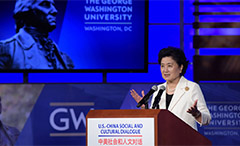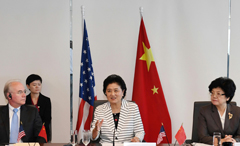Vice-premier expects youths to promote China-US ties in future
2017-09-29
Xinhua
WASHINGTON/HOUSTON — Addressing an audience of several hundred in Washington on Sept 28, Vice-Premier Liu Yandong said she had high expectations for young people in China and the United States to promote bilateral ties in the future.
LIFE-CHANGING CHANCE
“I hope to have a future career in public diplomacy to increase mutual understanding between the United States and all other countries, and China is especially important because it plays such a big part on the global stage,” said Hannah Radner, a graduate student of George Washington University.
Radner was among hundreds of Chinese and US youths gathering in Washington on Sept 28 for a conversation with Liu, who co-chaired the first China-US Social and People-to-People Dialogue with US Secretary of State Rex Tillerson early in the day.
For those like Radner, Liu’s message was clear: Young people have always been in the vanguard of people-to-people and cultural exchanges between China and the United States.
“It’s my hope that young people will set a global vision, embrace the world and always look forward,” said Liu.
Despite differences between China and the United States, the two sides agree that a constructive relationship between the largest developing and developed country benefits the world at large.
In her speech, Liu quoted the famous American postwar sinologist, John King Fairbank, who said 45 years ago that “from 1950 to 1971 Washington sent more men to the moon than to China.”
Fairbank’s remarks now seem incredible to most people, as cultural and people-to-people exchanges between the two countries have already become common.
Since China adopted its reform and opening-up policy nearly 40 years ago, the number of Chinese students studying in the United States has increased from 52 a year at the very beginning to 175,000 last year.
Meanwhile, according to the US Education Department, more than 14,000 American students study in China each year.
“I hope that an increasing number of American students will have this opportunity to get to know fellow students and experience China’s beauty and culture,” US Secretary of Education Betsy DeVos said at the same event.
“US-China cooperation is grounded in mutual respect and shared interests. Education and workforce development are signature issue areas that have benefited from a successful history of US-China dialogue. We look forward to expanding that history,” she added.
For Mycal Ford, a young African-American professional who studied in China from 2010 to 2014, the exposure to Chinese culture was life-changing.
“The idea of China was very foreign to me,” Ford said. “I actually had no working knowledge of China.”
However, Ford seized the “phenomenal chance” and went to China.
Ford told the audience on Sept 28 at George Washington University that he was privileged to contribute to the promotion of cultural exchanges between China and the United States.
RESPONSIBILITY OF YOUTHS
In the future, youths in China and the United States will bear the responsibility of promoting the healthy and stable development of bilateral ties.
“Now, the baton of history has passed to you. I am confident that with unremitting efforts, the China-US relationship will usher in a better future,” the vice-premier said.
The life-changing story of Ford was by no means an exception. According to Sean W. Zhang, president of the Ameson Education and Cultural Exchange Foundation, most American students in his foundation’s one-year overseas study program said their understanding of China was completely changed after their trip to China.
“They especially praised the Chinese people for being very friendly and the development of China was not what they had heard about,” Zhang told Xinhua.
“Those outstanding American students selected by us to study in China represent the future of the United States, and some might even become elites of the US society, such as policymakers,” said Zhang. “Years later, if they get information about China that is different from what they experienced when they were young, they may be able to question their information and make reflection.”
Jon R. Taylor, a political science professor at the University of St. Thomas in Houston, said Chinese and US leaders are creating a sense of continuity in bilateral relations and expanding that continuity into different cultural programs and educational opportunities.
“The robustness, the depth of understanding, is incredibly increased by having these exchanges,” he said, adding “understanding each other is better than not understanding who and what we are and where we are coming from.”
“To me, if you’re going to understand not just China, not just China-US relations but to understand the world that they’re going to live in the 21st century, you need to be able to understand China among other places. And to be in China three months, six months or a year, is incredibly important,” he said.


